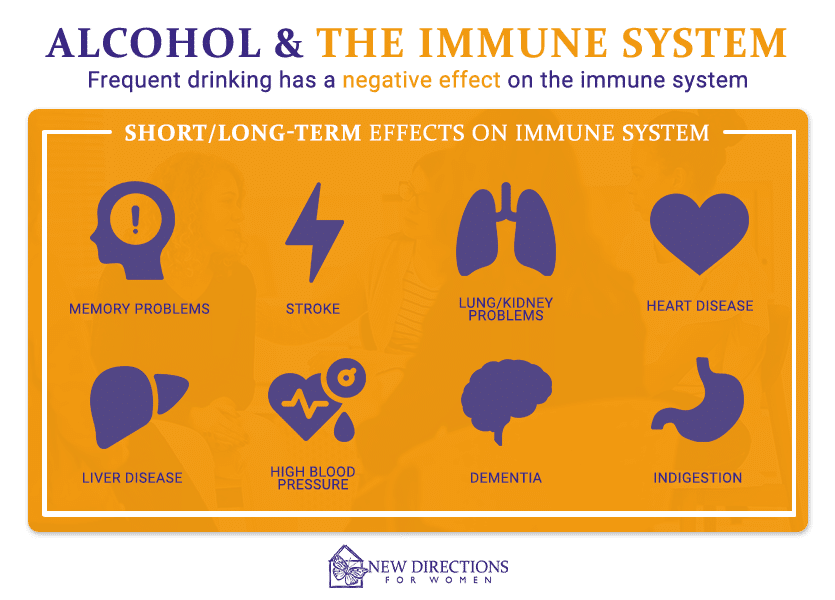Many people take vitamins each day in hopes of remaining healthy. In fact, some individuals take vitamin C supplements to boost immunity. No one wants to participate in activities that suppress the body’s immune system. Without knowing it, you may consume substances that strain immunity. Does alcohol weaken your immune system? It is important to uncover how drinking affects your body’s ability to fight diseases.
Alcohol and Immune System Functions

Drinking alcohol can dampen a person’s immune system. As a result, a person becomes vulnerable to infections that invade their body. In fact, a person’s immune system is complicated. It contains numerous cells and proteins that recognize infections and fight them. There is a clear negative relationship between and alcohol and the immune system.
Indeed, the immune system requires time to establish a response to a foreign invader. Therefore, when a person gets sick, the initial symptoms are bothersome and noticeable. As things progress, an individual’s immune system response improves and becomes strong enough to attack and eliminate the bacteria or virus that is present.
Poor Response to Antibiotics
Alcohol wreaks havoc on a person’s immune system response. As a result, an individual’s body takes longer to identify and respond to infection. Therefore, symptoms may last longer and may become more intense than normal. When severe instances occur, a person’s immune system may not be powerful enough to get rid of the infection. In other words, an infection may develop into something dangerous. Most times, antibiotics help. However, there are certain bacteria that do not respond to drugs or medical treatment. In essence, a person may not be able to recover.

Short-term Effects of Alcohol on the Immune System
When it comes to alcohol and the immune system, it doesn’t require high amounts of alcohol to affect the immune system. In fact, the National Institute on Alcohol and Abuse and Alcoholism explains that one episode of drinking can cause problems. In the short term, alcohol and the immune system are related. An individual who drinks small amounts of alcohol will have a suppressed immunity for a short amount of time.
Alcohol distracts a person’s body. When an individual drinks, his or her body’s main focus is on processing the alcohol. In fact, this is extremely taxing. As a result, the body is depleted of energy to fight anything else, especially an illness. If a person is already sick, symptoms may worsen.
Long-Term Changes in the Immune System of a Regular Drinker
In fact, prolonged use of alcohol causes many problems throughout the body. Besides effects on the liver and other organs, an alcoholic experiences long-term immunity issues. To explain, alcohol has negative effects on the immune system on chemical and cellular levels. However, chronic drinking affects all parts of the body. For example, it heightens the chance of developing an infection that a normal person would not catch.
Also, long-term changes in immunity include the creation of inflammation, especially in the intestines. In the long run, it may lead to diabetes, heart disease, and cancer.
How Much Alcohol Weakens Immune System Function?
The National Institute on Alcohol Abuse and Alcoholism explains that heavy drinking is defined as consuming more than three to four drinks each day. Even though this large amount of alcohol can dampen immunity, it has been shown that moderate drinking can have similar effects as well. In the end, the best way to keep drinking from lowering the immune system is to quit consuming alcohol.
Binge Drinking: Alcohol and the Immune System
Obviously, the more that a person drinks, the more that his or her immune system will be damaged. In other words, binge drinking suppresses immunity at a high level. One episode of binge drinking has the chance to lower a person’s immunity for a full day.
Diseases Linked to Alcohol Misuse
To repeat, alcohol does cause the immune system to suffer. However, it can cause other conditions as well.
- High blood pressure
- Stroke
- Heart disease
- Liver problems
- Indigestion
- Cancer
- Memory problems
- Dementia
- Lung and kidney problems
Effects on White Blood Cells
Indeed, white blood cells are important parts of a person’s immune system. They are created in an individual’s bone marrow and move throughout the bloodstream in search of invaders that cause illness. Upon infection, they launch an attack.
One study at the University of Massachusetts Medical School examined the effects of alcohol on white blood cells. It was uncovered that “drunk” cells possessed only one-quarter of the efficiency to fight bacteria and viruses than “sober” cells. As a result, it was concluded that alcohol does leave the body vulnerable to infectious diseases.
Specific Health Problems Linked to Low Immunity from Alcohol Consumption
To repeat, alcohol weakens immune system functions. Chronic drinking can lead to a number of specific health problems. There are several negative health problems that could arise due to frequent drinking. Since there is a link between alcohol and the immune system, things only escalate as heavy drinking continues.
Respiratory Illnesses
A person with an alcohol misuse disorder is at a higher risk of developing respiratory illnesses, especially pneumonia. Also, conditions like tuberculosis and normal respiratory infections are more difficult to fight when alcohol is in the picture. Pulmonary problems are more prevalent in people with alcohol misuse disorders. The alcohol makes it difficult for the body to fight infections. In severe cases, a person may die from pneumonia.
Gastrointestinal Disorders
Overall, a person’s gastrointestinal system is quite delicate. Essentially, it balances organisms that help with digestion and the absorption of valuable nutrients. Also, a person’s gut is a layer of defense against diseases. When alcohol is consumed, it can wreak havoc on this bodily system. Alcohol passes through the stomach’s lining and small intestines.
When the balance is disrupted, it becomes difficult for the good bacteria in the gut to overcome the bad bacteria. Also, excess alcohol weakens the stomach’s lining, which allows dangerous microorganisms to enter other parts of the body. Drinking alcohol is a major factor in the disruption of the digestive system. As a result, a person experiences gastrointestinal challenges that lower immunity.
Infectious Diseases
It has been noted that when alcohol is consumed, it has a negative effect on a person’s immunity. As a result, it is difficult for a person to fight infectious diseases. It becomes challenging to recover from an infection. Two of the most serious diseases that can strike an individual are HIV and hepatitis C.
HIV and Hepatitis C
Usually, HIV and Hepatitis C are contracted through unprotected sex or contaminated needles. Since alcohol lowers a person’s inhibitions and judgment, a person is at risk for contracting these conditions. To make matters worse, drinking alcohol can dampen the body’s immune system. Under these conditions, a person’s risk of contracting these diseases heightens dramatically. In the end, the consequences may be fatal.
COVID-19
Recently, COVID-19 has become a concerning illness. Like other respiratory infections, this disease usually affects an individual’s lungs. Also, COVID-19 is linked to inflammation. In essence, this can cause dramatic effects on the body. Daily alcohol intake may turn an ordinary case of COVID-19 into a condition that requires hospitalization or that causes fatal results.
Unfortunately, the pandemic has caused many people to feel depressed and anxious. As a result, individuals turn to alcohol in order to feel better. Drinking at this time may actually lower immunity and make a person more susceptible to the disease.
Ways to Support the Immune System After Drinking
After alcohol exits a person’s body, the immune system will improve. There are other ways to encourage enhanced immunity as well.
- Lower stress
- Stop smoking
- Exercise regularly
- Eat a balanced diet
- Receive adequate rest
- Maintain a healthy weight
- Follow a solid hygiene routine
Dealing With an Alcohol Misuse Problem

When a person is addicted to alcohol, it becomes impossible to stop drinking without help. Of course, it is well known that drinking can lead to health issues, including organ failure. Does alcohol weaken your immune system? According to the World Health Organization, alcohol brings both short-term and long-term effects on every part of the body, especially the immune system. Overall, drinking weakens the immune system, which lowers its ability to fight various diseases. Also, heavy consumption raises the likelihood of developing ARDS, a severe complication of COVID-19.
Turn to New Directions for Women Today!
If you or a loved one has a drinking problem, it is vital to seek help. At New Directions for Women, we recognize the connection between alcohol and immune system function. Our trained staff provides support and therapies that help patients gain long-term sobriety. Of course, our goal is to bring top health to all patients. Let our team steer you in the right direction of successful recovery. Our safe and supportive environment in California makes it easier to complete treatment. For more information, contact us today.
References:
https://www.ncbi.nlm.nih.gov/pmc/articles/PMC4590612/
https://www.ncbi.nlm.nih.gov/pmc/articles/PMC2377009/
https://www.niaaa.nih.gov/alcohols-effects-health/alcohols-effects-body



